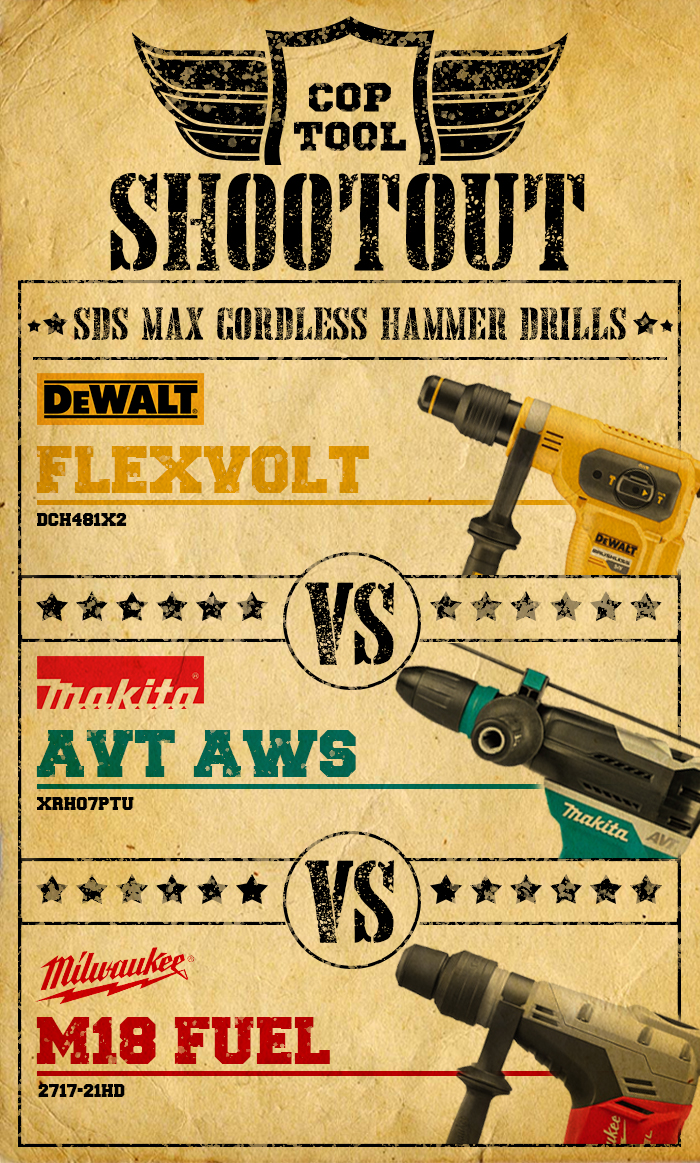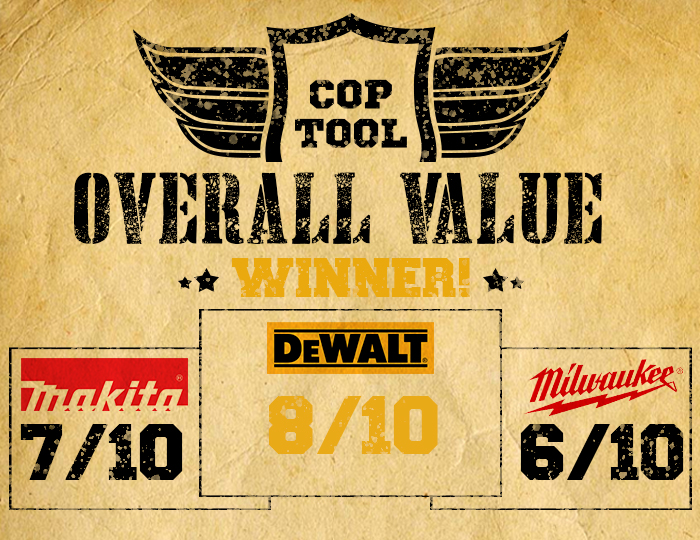The Best 2018 SDS-Max Cordless Rotary Hammer Drill 1-9/16″ – Dewalt, Makita, Millwaukee

Ladies and gentlemen, boys and girls, and children of all ages. Leeet’s get ready to HAMMER!!!
Dewalt FlexVolt (DCH481X2)
vs.
Makita AVT AWS (XRH07PTU)
vs.
Milwaukee M18 Fuel (2717-21HD)
This was a fun Shootout. Just hammering into concrete continuously with no restraints or limitations was very calming. We’ve tried to cover each base and the decisions were unanimous.
We’ve compiled our ratings into 5 categories, Speed & Power, Battery Run Time, Ergonomics, Special Features, and Overall Value. Each category was thoroughly tested and we’re confident in the outcomes. Keep in mind, Special Features and Overall Value are opinionated categories. You may have different values on these categories depending on your needs and loyalties. Anyway, let’s jump into the results!

We tested speed and power by seeing how quickly each rotary hammer was able to drill 10 holes 1″ holes through a 3-5/8″ thick cinder block. We used a Bosch HDC200 dust collection attachment on our shop-vac to keep the silica to a minimum. The time-code on our video footage was used to measure how long it took to drill each hole, determining precise start & finish times.
- 6.1 joules impact energy.
- 10 holes at an average drill time of 17.06 seconds per hole.
- 11.4 joules impact energy.
- 10 holes at an average drill time of 15.29 seconds per hole.
- 6.9 joules impact energy.
- 10 holes at an average drill time of 19.94 seconds per hole.
The clear winner is Makita. Nearly doubling the impact energy of it’s competitors, the specs alone determines the Speed & Power outcome. However, it is surprising that the Dewalt was faster by 2 seconds with a higher impact energy.

After we ran each hammer drill through ten holes in our speed & power test, members of the CopTool team continued to test each hammer drill until the battery was dead. We switched all 3 drills to a 1/2” diameter SDS-MAX bits for more user feedback and longer runtimes. Each did 12 more holes in the softer block concrete then we just did as many holes as possible in the poured concrete.
- 9.0Ah battery
- 12 holes in the concrete block
- 11 holes in the poured concrete slab
- x2 5.0Ah batteries
- 12 holes in the concrete block
- 11 holes in the poured concrete slab
- 9.0Ah battery
- 12 holes in the concrete block
- 9 holes in the poured concrete slab
With a 8/10, the winner of the Battery Runtime category was the Dewalt. It’s important to note that Makita uses two 5.0Ah batteries, so it should have had a little more juice than it’s competitors, but simply couldn’t drill an extra hole.

Speed, power and runtime are all very important considerations when selecting a rotary hammer, but if the tool is hammering your hands on the job, you’re less likely to work efficiently or accurately as the day drags on. We weighed each hammer drill with the battery and drill bit in place, measured the vibration at the handle using a Benetech GM63A Vibration Meter, and asked our Cop Tool testers to give us feedback on the “feel” of each hammer drill when drilling both the cinder blocks and poured concrete. We used all of these considerations to compile an Ergonomics score for each.
- Weight, 16.65lbs
- Average vibration registration of 25 m/s2
- Weight, 19.1lbs
- Average vibration registration of 13 m/s2
- Weight, 16.55lbs
- Average vibration registration of 25 m/s2
With a 9/10, the winner of the Ergonomics category was the Makita. The Makita also felt amazing compared to the DeWalt and Milwaukee. Although, the Milwaukee rated almost exactly the same as the DeWalt, every CopTool tester said the Milwaukee was easily the roughest hammer drill in their hands.

Like we stated earlier, each model shares the following same key features: cordless operation, brushless motor, and is rated for 1 & 9/16th inch. Now let’s take a look at what makes each model SPECIAL in this category…
Dewalt: 9/10
The Dewalt comes packed with a number of great features. The patented “E-Clutch” technology gives you enhanced control if the hammer drill gets you into a situation where the tool may bind up and throw that torque back into your hands. This is a good safety feature that can prevent costly hand & wrist injuries. The Dewalt is also the only model that offers 3 modes of operation: chipping, drilling, and hammer drilling, this was a surprise, drill only mode is not always on an SDS-Max drill. Finally, the Active Vibration Control really made a difference on the amount of impact this hammer drill has on its user.
Makita: 9/10
The Makita also comes packed with a number of special features. The most notable is the AWS (AutoStart Wireless System) that utilizes Bluetooth technology for wireless on/off communication between the tool and the optional dust extractor. Silica Dust Collections is no longer just a recommendation, the AWS system leaps ahead of anything else currently available. We already stated how impressed we were with the AVT anti-vibration technology, it really made a world of difference in performance, clearly the leader. The Makita also offers additional power control, in addition to the variable speed trigger, but not particularly useful in a hammer drill application. It comes equipped with an LED light for low-light jobs as well.
Milwaukee: 6/10
The Milwaukee simply doesn’t not have the same number of special features as Dewalt & Makita. However, it does have an LED light, but that’s about the extent of “special” on this model. No vibration control, no ONE-KEY options, just a good old fashion rotary hammer. It does however offer a 5 year warranty, which is 2 years longer than its competitors, but that’s about it.
We couldn’t choose just one winner in this category. Dewalt and Makita both have great features that are not only beneficial but too different to compare to one another. It truly depends on the individual’s application and preference.

These tools are available for purchase individually or as part of a larger kit that includes a battery charger and either one or two batteries. To make an equal comparison, we looked at the cost of each tool with a charger, enough batteries for TWO run cycles, and a case. These costs are accurate as of March 2018.
Dewalt (DCH48): 8/10
The Dewalt KIT will cost you $799 for the tool, 2 60V batteries and the Quick Charger (which you’ll definitely want in order to avoid a 3-hour charge on their standard chargers). We’ve seen a few flash sale price discounts offered online, but standard price at this point is $799 at beginning of March 2018.
Makita (XRH07PTU): 7/10
The Makita KIT will run you $749 for 2 batteries and a powerful charger that will charge both batteries at the same time in about an hour. However, because it takes 2 batteries to run it at all times, you’d need 4 batteries for a fair comparison at 2 full run-cycles That’s an additional $150, pushing the total cost to around $899. While it’s packed with special features and outperformed the competitors in the other categories, the Makita is the most expensive of the bunch. If you see a deal offering free batteries or additional price discounts, jump on it.
Milwaukee (2717-21HD): 6/10
The Milwaukee KIT with 2 M18 batteries and a Rapid Charger is available for $799, the same price as the Dewalt kit. After running several tests against the Dewalt, it’s hard for us to recommend this kit at the same price level. If you’ve already got other M18 tools in your possession, we’d say go for just the stand-alone tool.
With a 8/10, the winner of the Overall Value category was the Dewalt. Makita’s performance is shinning in every category but Dewalt is a very high second. Using only one battery and a smaller price tag, Dewalt was an easy choice for Overall Value.

THIRD PLACE – Milwaukee: 32/50
It’s a good SDS Max Hammer Drill, 5 year warranty, has impressive power for 18V, can get the job done, but well behind the competition for power, performance and other features.
SECOND PLACE – Dewalt: 40/50
the Dewalt proved to be a great SDS Max Hammer Drill. It’s a got a ton of advanced features and a great price point. Falling just behind the Makita, you can’t just pass up the Dewalt.
FIRST PLACE – Makita: 41/50
Makita is our Winner – Even though it’s currently the most expensive, it still performed at the top of every category we tested and and the user can just feel the difference. It’s pretty clear this is the best cordless SDS Max Hammer Drill on the market today.
Did we choose the right winner? Who would you pick, and why?

I really appreciate this post. I have been looking all over for this! Thank goodness I found it on Bing. You’ve made my day! Thx again!
Great site! I am loving it!! Will come back again. I am taking your feeds also
You have observed very interesting details! ps nice site. “‘Tis a sharp medicine, but it will cure all that ails you. — last words before his beheadding” by Sir Walter Raleigh.
You are a very clever individual!
fabuloso este conteúdo. Gostei bastante. Aproveitem e vejam este conteúdo. informações, novidades e muito mais. Não deixem de acessar para descobrir mais. Obrigado a todos e até mais. 🙂
Woh I enjoy your posts, saved to favorites! .